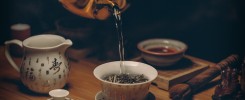By a veteran tea merchant and taster with over 20 years in sourcing, production, and wholesale of Chinese teas
Table of Contents
The Growing Fascination — and the Hidden Question
In recent years, Pu-erh tea has captured global attention. Known for its earthy aroma, digestive benefits, and collectible value, this fermented tea from Yunnan, China, is often praised as a “miracle drink.”
But as someone who has worked in both tea production and international distribution for over two decades, I’ve seen another side of the story — Pu-erh tea is not suitable for everyone.
While it offers tremendous health value when consumed properly, certain groups of people should limit or avoid it due to the unique chemistry of fermentation, caffeine content, and microbial activity that sets Pu-erh apart from other teas.
Let’s explore, in practical and scientific terms, who should not drink Pu-erh tea, and why moderation is key even for seasoned drinkers.
1. People with Sensitive Stomachs or Chronic Gastritis
Pu-erh tea, especially ripe Pu-erh (Shou Pu), undergoes a post-fermentation process that gives it a mellow, earthy flavor but also alters its acidity and microbial profile.
While this makes it gentler than green tea for many drinkers, those with gastric sensitivity or chronic gastritis should still be cautious.
- Aged Pu-erh tends to have mild fermentation acids and can stimulate gastric acid secretion, which might worsen acid reflux or gastritis.
- Drinking strongly brewed or empty-stomach Pu-erh increases this risk further.
Expert Tip:
If you enjoy Pu-erh but have a delicate stomach, choose well-aged, lightly brewed ripe Pu-erh, and always drink it after meals, not before. Avoid raw Pu-erh (Sheng Pu) under 5 years old — it can be too stimulating for your digestive tract.
2. People with Iron Deficiency or Anemia
Like most teas, Pu-erh contains tannins, which can bind to non-heme iron (from plant sources) and reduce iron absorption. Over time, heavy tea consumption — especially when paired with a vegetarian diet — may contribute to or worsen anemia.
In my years of trading tea to wellness retailers, I’ve often advised female consumers with low ferritin or hemoglobin to avoid drinking Pu-erh right after meals.
Expert Tip:
If you rely heavily on plant-based foods or iron supplements, keep at least one hour between your meal and tea session. Alternatively, add a slice of lemon or citrus peel to your Pu-erh; vitamin C can help counteract the tannin effect and improve iron absorption.
3. Pregnant and Breastfeeding Women
Pu-erh tea naturally contains caffeine — generally 30–70 mg per 8 oz cup, depending on age and brewing strength. While this is lower than coffee, it’s still enough to cross the placenta and affect a baby’s sleep and heart rate.
During pregnancy, excessive caffeine can also increase diuresis, leading to calcium loss, which may not be ideal for maternal bone health.
For breastfeeding mothers, caffeine passes into breast milk and can make infants irritable or restless.
Expert Tip:
If you love Pu-erh, limit yourself to one weakly brewed cup per day, and avoid drinking it late in the day. Aged ripe Pu-erh (with smoother, lower caffeine levels) is safer than fresh raw Pu-erh.
4. People with Insomnia or Anxiety
Pu-erh’s caffeine content is often underestimated because its earthy, mellow flavor feels calming. Yet chemically, it still contains methylxanthines — the same stimulants found in coffee and chocolate.
For individuals prone to sleep difficulties, rapid heartbeat, or anxiety, even a moderate intake of Pu-erh can disrupt sleep cycles or amplify nervous tension, especially when consumed after 3 PM.
Expert Tip:
Choose aged Shou Pu with longer fermentation; it tends to have lower caffeine and higher levels of theanine — an amino acid that promotes calm alertness. Avoid Sheng Pu altogether if you are caffeine-sensitive.
5. People with Gout or High Uric Acid
Pu-erh tea, particularly raw (Sheng) types, contains purine compounds, which can break down into uric acid during metabolism. For most people, this isn’t an issue.
However, if you already suffer from gout, hyperuricemia, or joint inflammation, frequent Pu-erh consumption may aggravate your symptoms.
The fermentation process of Shou Pu doesn’t eliminate purines; it merely changes their composition. Over time, excessive intake could burden the kidneys’ excretion function.
Expert Tip:
Limit Pu-erh to one cup a day, and drink plenty of water alongside it. Hydration helps your body flush out uric acid. Avoid heavily brewed or multiple steeps if you are managing gout through diet.
6. People with Low Blood Sugar or on Fasting Diets
One overlooked aspect of Pu-erh is its lipid-lowering and glucose-regulating effect — a reason it’s often marketed as a “weight loss tea.”
However, for individuals with naturally low blood sugar, Pu-erh may exaggerate hypoglycemia symptoms, especially if consumed on an empty stomach. The tea can accelerate metabolism and temporarily reduce glucose levels.
Expert Tip:
Always pair Pu-erh with light snacks or after-meal sessions if you have low blood sugar. Avoid drinking it during intermittent fasting or early mornings without food.
7. Medication Interactions — A Caution from Practice
Over years of wholesale distribution, I’ve worked with customers who take antihypertensive, anticoagulant, or diabetes medications. In these cases, the problem isn’t the tea itself but its timing and interaction.
Caffeine and catechins can interfere with drug absorption or amplify side effects. For instance, Pu-erh may slightly enhance the effect of blood thinners or diabetes medication, leading to dizziness or low blood pressure.
Expert Tip:
If you’re on daily medication, keep at least a two-hour gap between your tea and your pills. Never mix the two within the same meal period.
The Right Approach: Respect the Tea, Respect Your Body
Pu-erh tea is one of the world’s most sophisticated beverages — a product of controlled fermentation, centuries of craftsmanship, and living microbial culture. But as with wine or coffee, its benefits depend entirely on context, body type, and balance.
For most healthy adults, a few cups a day are perfectly safe — even beneficial. But understanding your limits is a sign of tea wisdom, not restriction.
When I train young tasters, I often remind them:
“A good tea never forces itself on you. It should meet your body halfway.”
So, drink Pu-erh with awareness. Choose aged, clean, properly stored tea. Brew it gently, avoid extremes, and listen to your body’s response. That’s how you truly respect this ancient drink.
Final Thoughts
The next time someone calls Pu-erh a “universal health tea,” remember — even the finest leaves are not medicine for everyone.
For those who know when not to drink Pu-erh, the experience becomes deeper, safer, and more meaningful. Because true tea wisdom isn’t just about what you drink — it’s about knowing your body, your timing, and your limits.
And that, in the end, is the essence of being a real tea drinker.

